celebrity radar - gossips
City People Lecture: Scraps Of ODIA OFEIMUN “How To Restructure NIGERIA Without Tears”
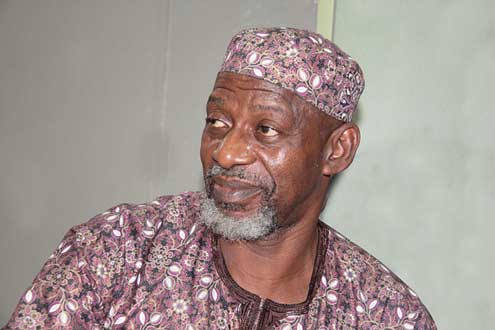
The City People Magazine held its founders day lecture last week Thursday, 22nd September 2016 at the White House Event Centre along Toyin Street in Lagos.
Internationally celebrated writer and poet, Odia Ofeimun was the Guest Speaker and trust the Edo born writer he held his listeners spell bound as he delivered his well researched paper on How To Restructure The Nigerian Federation which earned him a standing ovation.
His speech last week really showed Odia at his best as he dropped his bombshell on the need to restructure the Nigerian federation which he says is inevitable.
According to him, unless Nigeria is restructured not much can be achieved in the country. In his lecture he surveyed the history of Nigeria and concluded that the damage wrought by British colonialism needs to be corrected through restructuring so that all the various ethnic nationalities may become genuinely self-governing and ready to exercise the creativity that is so much part of the national character.
Odia says the real issue, as he sees it is not Regionalism or Ethnicity. He says it is a refusal to accept that Ethnicity is an important status in the life of all human beings irrespective of where they live, whether it is in Britain, America, Russia, wherever and those who are denying the embrace of their own nationality are been denied a way of having wholesomeness as human beings, and as spiritual beings and as human beings in the life that they live. “If you remove from a people, their sense of engagements with their close neighbours you are actually removing from them a sense of self. We all need it. And the idea that Tribalism necessarily distorts a sense of national unity is not true at all. In those days, a group in the North opposed Free Education for children in the North. But Awolowo didn’t quite understand why they would oppose free education since their kids are supposed to benefit more. But the Northern group argued that if they implemented Free Education, more money will be spent in the South than in the North because there are more children in schools in the South than in the North.
Awolowo’s arguments was straight forward. If it is true that the population of the North is more than that of the South, if more children are in school, it will follow that the total in this period will outstrip the South, in the monies they collect. What this people want is for the North to continue to be the determinent of events in Nigeria.
Odia revealed in his lecture how the British colonialist prepared Northerners to rule by putting them ahead of other groups by the size of population, the land and by military power. Northerners were specially drafted into the Army to prepare for the day when soldiers will be the deciders of who to rule, he explained.
He also explained how to bring about and ensure True federalism via motions to be passed by all the Houses of Assemblies in Nigeria. He says Nigerians need to be mobilised to understnad how aspects of the National Conference recommendations can be implemented. He advocated that Nigerian political leaders should go back and read Awolowo’s recommendations on how to restructure Nigeria.
He says some of what is wrong with Nigeria is the absence of vibrant political parties that functioned in the way political parties functioned in the 1st Republic. He advocated for parties to have functional party offices.
He frowned at the budget padding scandal currently rocking the National Assembly. He wondered why although Buhari came in saying he wants to fight corruption but the minders of the National Assembly seemed uninterested in having an income policy that is of any value even to themselves or anyone else.
They just want to continue to make demands on the system and get away with it. There is nowhere in the world where a legislator who pads a budget will not be considered a thief and treated as such within the Law. It won’t happen in Britain because the process of putting your own special demands in the budget will pass through process which means you have proper bureaucracy that deals with it.
Odia advocated for the setting up strong and proper political parties that are based on subscription. What we have just experienced today tells you why it has been impossible. In the days of the Unity Party of Nigeria we never gave money to people to attend meetings. They actually come to the meetings and drop something if you call a senatorial meeting now and people know there will be no envelopes to be given out or money to be shared, you won’t see anybody. At some level you will actually find people who would actually meet people who would like to work for the party but they don’t have money of their own. These days’ people will do anything to collect money from the candidate.
Some people suggest a return to military rule as a way out. From what we have known from Military rule that is not an option. What people must remember is that the soldiers who took over in 1966, even within the army, were already more tribalistic and more corrupt than the civilians that they toppled.
The story of the Nigerian Army before that coup was the story of corruption and tribalism edged on by the system because, don’t forget, you have to have a quota to enter an army And if you are going to have a quota to enter an army, it means you are been told that you have to be a member of a proper ethnic group recognised before you could join the Nigerian Army.
There must be somebody one day who will come to fix all these and knock it together. I always knew that Buhari won’t have the spine to do it. To be able to do a thing like that you must be genuinely knowledge many of our leaders do not know Nigeria.
And they don’t seem to care enough about the country to be able to draw up programmes that will ensure commitment to goals. It was a good example when APC appeared to believe a social welfare programme that maybe could create a critical mass of people who are educated enough to be consciencetised and made to work for party subscription.
For those who don’t know this 66 year old scholar and researcher well, let’s quickly tell you about him and why everyone usually likes to listen to him speak on topical issues. It is because of his deep knowledge of Nigerian history and politics, so also the personalities who have shaped our public policy.
Ofeimum is an institution, a moving library. He is prodigious, profound and practical. He is the author of over 40 books and he has given himself a fresh target of writing 15 new books between now and when he is 70. He is modest, sociable, fervent and a conversationalist with empathy for all. Interestingly, his books cover so many issues dealing with the Nigerian situation with some of them reaching back to Edo kingdom of the 15th century, which he so deftly links to addressing present day challenges in the State.
Recall it was Odia that settled the dust raised about Obas ranking, in his highly famous essay: “Why Oba Of Benin Is Number One”. Odia Ofeimun is not just a literary icon; quite frankly, his credentials are intimidating. Or what do you make of someone who is an author of over 40 books, Fellowship from Oxford University, Graduate of Political Science, University of Ibadan, where his poem won 1st prize as a student, former Private (political) Secretary to the late sage and foremost political figure in Nigeria, Chief Obafemi Awolowo.
Recipient of Fonlon Nichols Award for literary excellence and propagation of Human Rights by the African Literature Association.
Former member of Editorial Board of Guardian Newspapers Former Chairman, Editorial Board, AM News, The News and Tempo Magazines in the era of Guerrilla Journalism, former Publicity Secretary, General Secretary and President of Association of Nigerian Authors, founding Member PAN Africa Writers Association, former Administrative Officer in the Federal Public Service Commission, Assistant Divisional Officer (A.D.O) Kankia, old Kaduna State, a teacher at Ansarul Islam Grammar School, Ijomu Oro,
News reporter at Midwest Echo in Benin City, Factory Labourer at West African Thread Company, Apapa.
As a writer he is definitively a commanding polemicist.
His seminal books on Politics and Culture include Taking Nigeria Seriously, when does a Civil War come to an end, Remaking the Nigerian Project, a House of Many Mansions, in Search of Ogun: Soyinka Inspite of Nietzche and an Agenda for a Progressive Nigeria.
Apart from being a poet and journalist, Odia is also a politician who is interested in the politics of Nigeria and Edo, his homestate which explains why in April he joined the governorship race in Edo on the platform of Labour Party, making 7 key promises, namely (1) To Wipe Out Illiteracy For All Citizens From Age 5 To 60 (2) To Replan And Rebuild Every Village, Town And City (3) To Build A Super Dome Underground Railway Station At Oba Square In Benin City (4) To Create Full Employment By Producing In The First Instance 60% And More, Of The Goods And 80% More Of The Foods Consumed In Edo State (5) To Establish A Health Care System, Free For Majority Of Citizens (6) To Mobilise An Aggressive And (7) His Promises To Make Edo State A Proper House Of Culture.
Odia Ofeimum learnt a lot from the late sage, Awo who he worked with closely. He was a former Private (Political) Secretary to Chief Obafemi Awolowo, Nigeria’s foremost political philosopher and leader of the Unity Party of Nigeria.
celebrity radar - gossips
Another Feather for Nollywood Icon Fidelis Duker
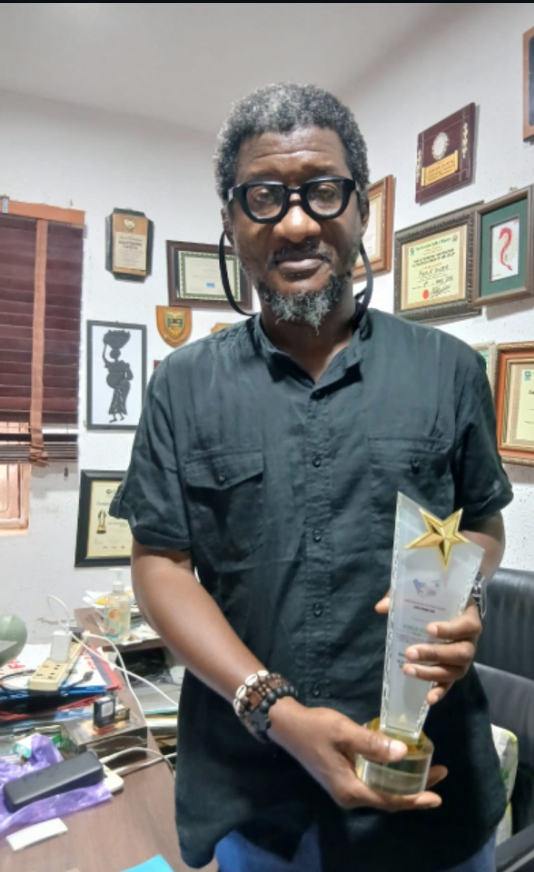
**Another Feather for Nollywood Icon Fidelis Duker
*Lagos, Nigeria* — In a remarkable celebration of artistic achievement, renowned Nollywood figure Fidelis Duker received yet another prestigious accolade last weekend, solidifying his role as a key player in the growth of the Nigerian and African film industries. The award was presented in a ceremony held at Duker’s Lagos office by esteemed film and theatre director, Mr. Alex Eyengho, founder of the Warri International Film Festival, alongside Marketing and Strategy Director, Mrs. Matel Eyengho.
The recent recognition builds upon Duker’s previous achievement at last year’s ECOFEST in Dakar, where he was honored with a Lifetime Achievement Award. This latest accolade is a testament to his unwavering dedication and substantial contributions to the cinematic landscape.
“I am truly humbled by this recognition,” Duker expressed during the event. In his speech, Alex Eyengho lauded Duker’s pioneering efforts in establishing significant film festivals in Nigeria, particularly the Abuja International Film Festival, which has played a vital role in promoting local talent and storytelling.
Eyengho emphasized, “Fidelis has not only paved the way for emerging filmmakers but has also helped elevate Nigerian cinema on the global stage. His creative vision and commitment inspire all of us in the industry.”
As Duker reflects on this honor, he acknowledges the importance of teamwork and collaboration in achieving success. “This acknowledgment reaffirms to my team and me that our work is being observed, and it motivates us to continue contributing to the development of our sector,” he stated.
With numerous projects on the horizon, Duker remains a relentless advocate for the growth and recognition of African cinema. His latest recognition is yet another testament to the vibrant and evolving landscape of Nollywood, as industry leaders like him continue to inspire future generations.
As the film industry anticipates the next phase of development, Duker’s continued influence signals a promising future for filmmakers in Nigeria and across the continent.
celebrity radar - gossips
E‑Money’s Grand Gesture: A Closer Look at the SUV Gift to Chinedu “Aki” Ikedieze

E‑Money’s Grand Gesture: A Closer Look at the SUV Gift to Chinedu “Aki” Ikedieze
By George Omagbemi Sylvester | Published by SaharaWeeklyNG
“Public Generosity, Celebrity Loyalty and the Symbolism of Wealth in Nigeria’s Entertainment Elite.”
On Tuesday, February 17, 2026, Nigerian billionaire and entrepreneur Emeka Okonkwo, widely known as E‑Money, once again captured national attention with a lavish and highly publicised act of generosity, gifting a brand‑new 2024/2025 Ford SUV to veteran Nollywood actor Chinedu Ikedieze, affectionately called Aki, during his high‑profile birthday celebration.
The event, held in Lagos amidst a constellation of entertainers, business figures and socialites, was itself part of an annual tradition in which E‑Money marks his birthday (on February 18) with large‑scale giveaways and spectacular shows of material philanthropy. This year, he announced the gift of over 30 cars to friends, staff and family, a gesture that quickly went viral as videos and images circulated across social media platforms.
In the case of Ikedieze, E‑Money’s gift appeared to be deeply personal. During the festivities, E‑Money stood beside his elder brother, Grammy‑nominated musician KCee and recounted how Ikedieze stood by him at his 2007 wedding. The billionaire explained that the SUV was a “token of appreciation” for the enduring support the actor had shown over the years which is a narrative that blends friendship with public celebration.
Ikedieze, a Nollywood staple with a career spanning more than two decades and over 150 film credits, including the iconic Aki na Ukwa franchise, visibly reacted with humble surprise as he received the vehicle, bowing his head in respect and gratitude. The actor later shared the moment on his Instagram account with a caption celebrating the gift, further fuelling online engagement around the event.
Beyond the spectacle, this incident underscores evolving dynamics in Nigerian celebrity culture and the intersection of wealth, influence and reciprocity. Sociologist Dr. Chinedum Uche of the University of Lagos, speaking on the broader implications of such high‑profile gifts, notes: “Philanthropy that is highly publicised can reinforce social bonds, but it also reflects a culture where generosity is intertwined with reputation economy; where giving becomes as much a social signal as it is an act of kindness.” The quote highlights how public acts of wealth transfer among elites serve layered social functions that extend beyond pure altruism.
Critics of such displays argue that ostentatious giveaways, particularly in a country with stark economic disparities, risk amplifying social envy and exacerbating perceptions of inequality. Economist Dr. Ifunanya Nwosu from the Lagos Business School observes: “In societies marked by economic stratification, celebrity largesse may inspire admiration, but it can also inadvertently highlight structural inequities; prompting questions about systemic investment in public welfare versus individual generosity.”
Still, supporters maintain that E‑Money’s annual tradition (which has in past years included cash gifts to his brother KCee, comedians and even domestic staff) reflects genuine gratitude and a commitment to uplifting his immediate circle, albeit within the private sphere.
For Ikedieze, the SUV stands both as a heartfelt gesture from a longtime friend and a public affirmation of their enduring relationship. As the video of the moment continues to circulate, the broader narrative has ignited discussions about the role of private wealth in public life, celebrity culture and how acts of giving are interpreted in contemporary Nigerian society.
In a landscape where influence and generosity often play out in equal measure on public stages, E‑Money’s gift to Aki is more than a headline, it is a flashpoint in ongoing debates about wealth, friendship and visibility in Nigeria’s entertainment and entrepreneurial ecosystem.
celebrity radar - gossips
Spiritual Reality: Wicked People Are Possessed by Wicked Spirits — Dr. Christian Okafor
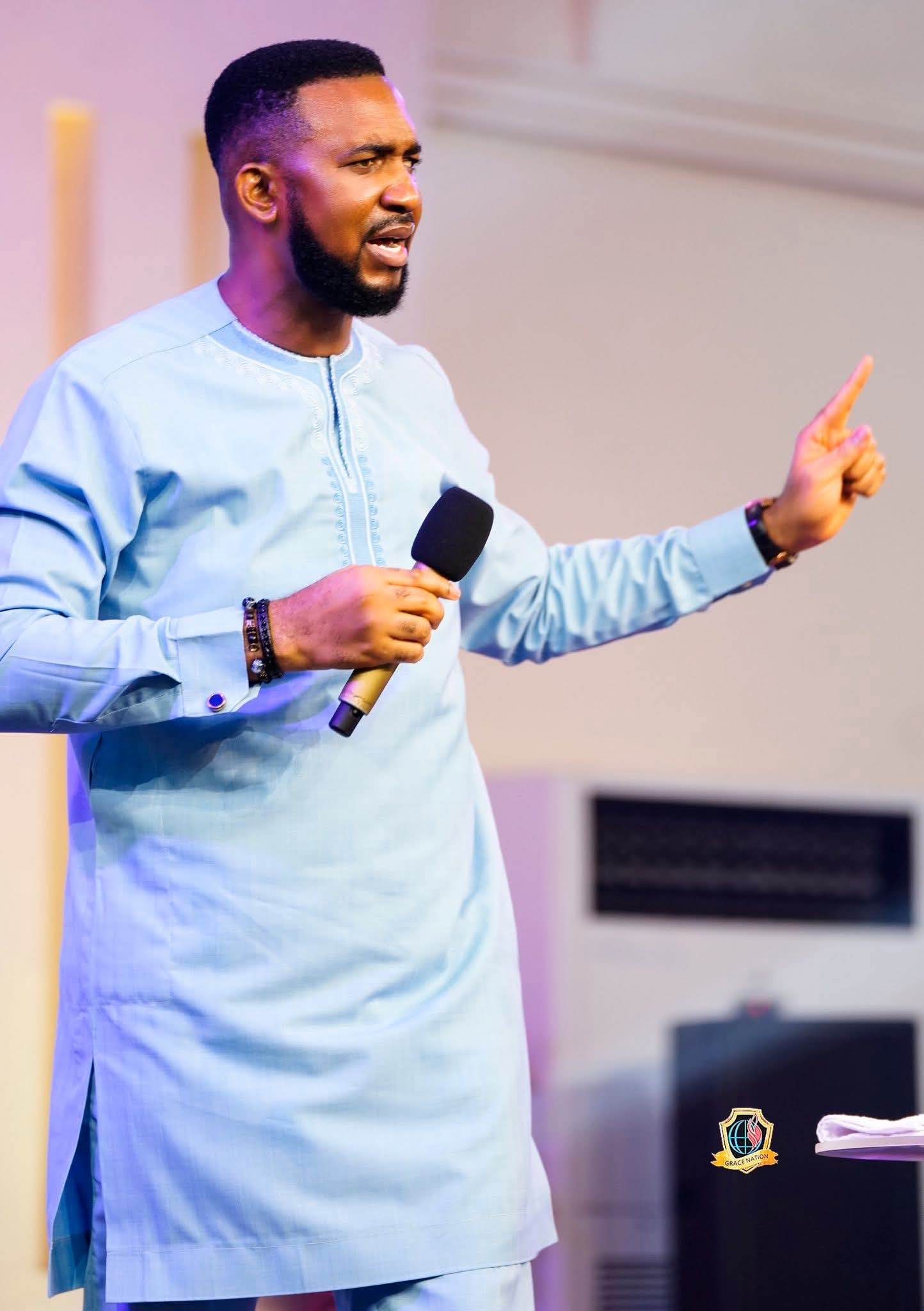
Spiritual Reality: Wicked People Are
Possessed by Wicked Spirits — Dr. Christian Okafor
…..“You don’t need to offend them before they attack you.”
…..“Your only true help comes from God.”
Demons are strategic and calculating. They detect threats quickly and position themselves to resist any power that may expose or overpower them.
According to the Generational Prophet and Senior Pastor of Grace Nation Global, Christian Okafor, spiritual intelligence operates both in light and in darkness—and believers must understand this reality.
Dr. Okafor delivered this message on Thursday, February 19, 2026, during the midweek Prophetic, Healing, Deliverance and Solutions Service (PHDS) held at the international headquarters of Grace Nation Worldwide in Ojodu Berger, Lagos, Nigeria.
The Operations of Demons
Teaching on the subject “Spiritual Reality” with the subtitle “Operations of Demons,” the Man of God explained that when demons possess individuals, their behavior changes. Such people may attack, bully, or resist those sent by God to help them, unknowingly rejecting divine assistance and prolonging their struggles.
“You don’t need to offend a demon before it attacks you,” he said. “What you carry is enough to provoke opposition. The greater your potential, the greater the battle.”
Dr. Okafor noted that many believers misinterpret battles as signs that God has abandoned them. However, he explained that some battles are permitted for growth, training, and divine glorification.
According to him, God may allow certain confrontations so that believers understand spiritual warfare and emerge stronger.
“Some battles are necessary,” he emphasized. “They push you into your turning point.”
He further stated that God does not respond to lies, blackmail, or bullying. He responds to His Word. Therefore, opposition is not proof of God’s absence, but often evidence of destiny at work.
The Weapon Against Demonic Attacks
Addressing solutions, Dr. Okafor described prayer as the strongest weapon against satanic operations.
“Prayer is the license that invites God into your battles,” he declared. “God does not intrude—He responds to invitation.”
According to the Apostle of Altars, understanding the principles and discipline of prayer enables believers to receive divine strategies for overcoming demonic resistance. Without prayer, he warned, spiritual help cannot be activated.
“You cannot receive help without God,” he concluded. “And you cannot engage God without prayer.”
Manifestations at the Service
The midweek gathering was marked by a strong move of the Spirit, with testimonies of deliverance, miracles, restoration, and solutions to various challenges presented before God. Several individuals reportedly committed their lives to Christ during the service.
-

 celebrity radar - gossips6 months ago
celebrity radar - gossips6 months agoWhy Babangida’s Hilltop Home Became Nigeria’s Political “Mecca”
-

 society6 months ago
society6 months agoPower is a Loan, Not a Possession: The Sacred Duty of Planting People
-

 society5 months ago
society5 months agoReligion: Africa’s Oldest Weapon of Enslavement and the Forgotten Truth
-

 news6 months ago
news6 months agoTHE APPOINTMENT OF WASIU AYINDE BY THE FEDERAL GOVERNMENT AS AN AMBASSADOR SOUNDS EMBARRASSING



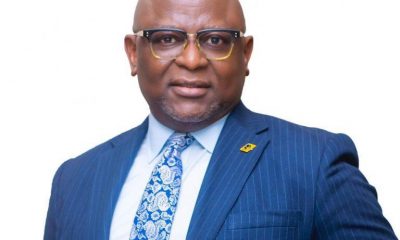

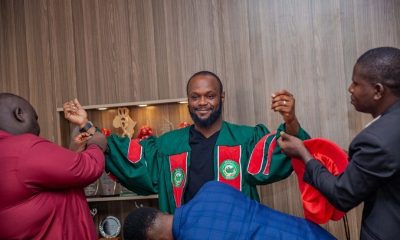



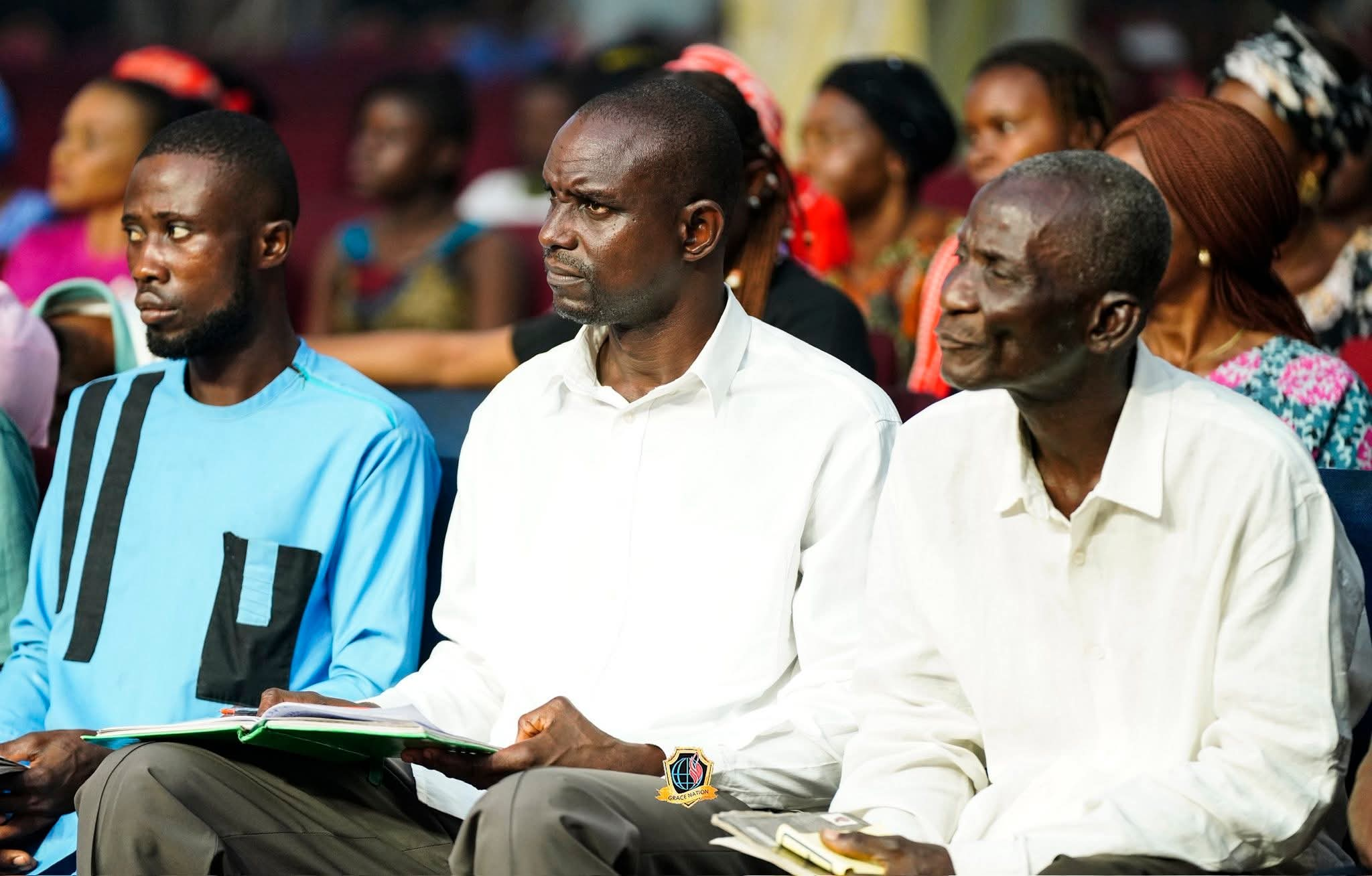

You must be logged in to post a comment Login